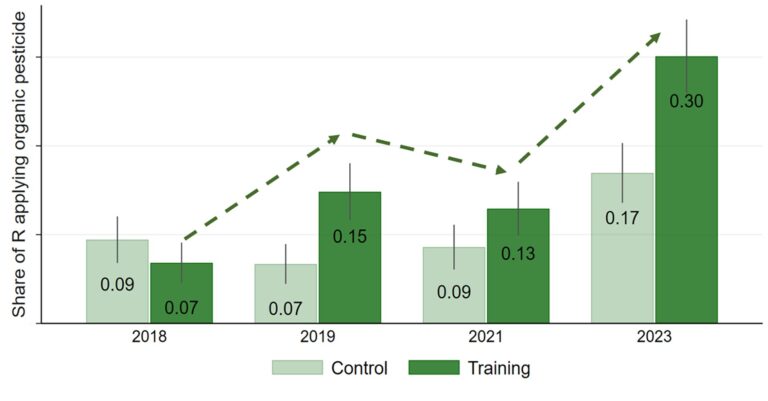The illustration shows that the transition to organic farming is not linear, but training measures can accelerate the process. Photo credit: Dr. Nathalie Lack, University of Passau
A team of economists from the University of Passau has been investigating for several years in Indonesia what measures can be taken to ensure sustainable farming practices in the long term, and they have found that training, soil testing and awareness-raising are cheap and effective ways to support the process.
Indonesia is feeling the effects of intensive agriculture – soils are losing fertility and pesticide residues are contaminating food and groundwater – so politicians and non-governmental organisations have been trying for years to encourage a shift to sustainable farming methods, but so far with little success.
“These measures are not targeted enough and do not engage smallholder farmers,” says Michael Grimm, professor of development economics at the University of Passau, who, together with his former colleague Dr Nathalie Lack, has been investigating in various projects over the past few years whether specific training and awareness-raising measures could speed up this process.
The research team investigated whether farmers are more willing to adopt organic farming practices when they learn more about them and realize that they improve soil quality. The researchers followed more than 1,100 farmers from 60 villages in three different districts in the provinces of Yogyakarta and Tasikmalaya over a six-year period.
Between 2018 and 2023, the economists conducted a total of four rounds of data collection and a randomized field experiment with a treatment group that received the training measures and a control group that did not receive the training.
Survey results at a glance:
- The transition to organic farming is not a straight line: there are “early adopters,” “non-adopters” who stop and start again later, and “late adopters.”
- Group practice is key: Farming groups have been unable to meet as a result of contact restrictions imposed by the pandemic, causing a stagnation in some areas.
- If farmers receive practical training and are adequately sensitized to the issues, they are more likely to adopt sustainable practices. Farmers who participated in the training had a 17 percent higher use of organic fertilizers without compost than the control group. Nitrogen use was also significantly reduced compared to the control group.
- Training programs are even more effective when combined with soil testing, allowing farmers to see improvements in their soil quality.
“The data shows that over time, a level of knowledge and awareness of the issues builds, which leads to increased adoption of sustainable practices,” says Grimm, though research suggests that in some cases the benefits of training fade after just a year.
“To achieve lasting results, further measures and support from local extension workers to carry out regular soil testing are needed,” Dr Lack said.
For more information:
Sustainable agriculture in Indonesia: Two steps forward, one step back: www.digital.uni-passau.de/en/b … farming-in-indonesia
Policy brief: www.wiwi.uni-passau.de/fileadm … /Policy_Brief-15.pdf
Courtesy of University of Passau
Quote: Researchers Identify Sustainable Farming Practices in Indonesia (July 8, 2024) Retrieved July 8, 2024 from https://phys.org/news/2024-07-sustainable-farming-indonesia.html
This document is subject to copyright. It may not be reproduced without written permission, except for fair dealing for the purposes of personal study or research. The content is provided for informational purposes only.


